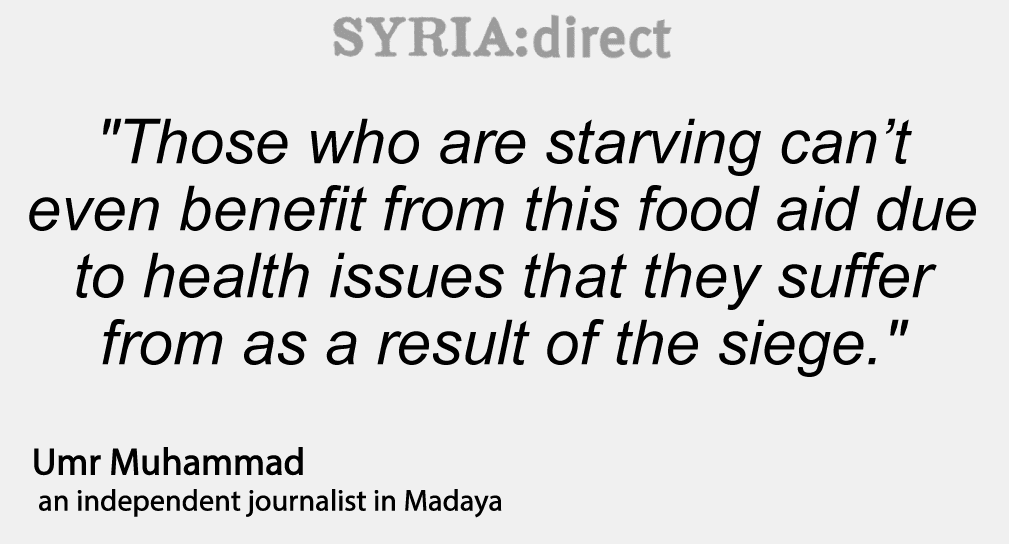Three interviews from three besieged rebel towns: ‘Aid temporarily postponing impending death’
The Syrian Arab Red Crescent delivered thousands of food baskets […]
18 February 2016
The Syrian Arab Red Crescent delivered thousands of food baskets to five blockaded towns on Wednesday as part of a deal agreed upon by world powers last week in Munich.
The deal hammered out in Munich last Thursday between dozens of countries and, notably, the United States and Russia, called for a “cessation of hostilities” within one week and stipulated the “sustained delivery of assistance” to seven blockaded areas and towns in Syria: Madaya, Deir e-Zor, Fuaa and Kafariya, Outer Damascus, Moadimiyet a-Sham, and Kafr Batna.
In accordance with the agreement, 100 trucks carrying “humanitarian aid” set out early Wednesday morning from the capital Damascus towards Madaya, Moadimiyet a-Sham, Zabadani, Fuaa and Kafariya, reported the Syrian Arab Red Crescent on their official Twitter page.
On Thursday, the Red Cresent published several pictures of the aid caravans after they arrived in these “hard to reach areas” Wednesday evening.
The deal calls for regular aid deliveries to all seven of the blockaded areas. Syria Direct could not confirm whether future aid deliveries were scheduled or when aid would reach Kafr Batna and Deir e-Zor.

In rebel-held Madaya, Moadimiyet a-Sham and Zabadani in Outer Damascus, residents scrambled to claim food baskets before volunteer distributors ran out, two journalists and a member of one local council in the towns tell Syria Direct’s Bahira al-Zarier, Heba al-Khajja and Majdi a-Shami.
“The aid is nothing more than temporarily postponing impending death,” says Umr Muhammad, an independent journalist in Madaya.
Umr Muhammad, an independent journalist in Madaya:
Q: How much did the Red Crescent deliver to Madaya? What was it? How was it distributed?
36 trucks carrying food baskets arrived in Madaya early Wednesday evening.
Each basket contains some canned beans, four kilos of lentils, ten kilos of rice, five kilos of sugar, six kilos of chickpeas and four liters of vegetable oil.
Volunteers, under the supervision of the Local Council in Madaya, handed out the food baskets according to the number of individuals in each family inside the town. They prioritized getting food to the families with sick individuals and children.
Q: Was the aid enough for all of the families? How long will the aid last?
Considering that there are over 40,000 people inside the town, the aid isn’t enough for everyone and won’t last long. Residents here need the necessary treatment so that they can recover from starvation since so many of the besieged inside Madaya and Buqayn suffer from malnutrition, digestive complications, and other chronic ailments that require immediate medical attention.
This amount is only enough for a few days. We call on the United Nations to break the siege and evacuate the sick that they promised to help. There are 400 people in need of immediate health care due to the lack of food.
Those who are starving can’t even benefit from this food aid due to health issues that they suffer from as a result of the siege. They need medical attention.
Q: How did people react to the delivery of aid?
Residents want the blockade to be lifted and for a humanitarian corridor to be opened. The aid is nothing more than temporarily postponing impending death. They are still suffering under the blockade and fear the inevitable return of hunger and the cold.
Wasim al-Ahmad, a member of the local council in Moadimiyet a-Sham:
Q: What did the aid consist of? How long will it last?
Thirty-four trucks carrying food aid entered the city [on Wednesday] carrying 4,350 food baskets, but it wasn’t enough to cover the needs of all of the families here. There are approximately 8,000 families that live here, including displaced residents from Daraya, and about half of them didn’t get a food basket.
Also, if the family is big, then the basket will only last them for one month. For small families, the contents of the basket might last them two months at the most.
Each basket contained rice, bulgur, lentils, beans, chickpeas, oil, sugar and flour.
Q: How were the food baskets distributed?
According to the distribution process laid out by the UN, one food basket goes to each family and it is forbidden to divide up the contents [between families]. This is the case even if the number of families is more than the number of food baskets. To get a food basket, civilians must present their family ledgers or marriage contracts.
We dealt with a lot of problems that arose between residents during the distribution process. All of the civilians are in need of food because of the constricting blockade and each one of them wanted to get their share of the food baskets that were delivered.
Noor Ahmad, a citizen journalist in Zabadani:
Q: How much aid was delivered to Zabadani and how long will it last?
[Wednesday], two aid trucks entered the city of Zabadani carrying 200 food baskets to the besieged residents there. Each basket contained five kilos of sugar, four kilos of beans, four kilos of lentils lentils, one kilo of pasta, four liters of olive oil, ten kilos of rice and six kilos of chickpeas.This amount is only enough for a few days. We request that the United Nations lift the siege, that the sick be let out of the city, and that regime and Hezbollah cease their acts of provocation and hostility. They have destroyed homes, burned lands, stolen property and blockaded the city with blatant disregard for civilians. Their policy of starvation is is a war crime in accordance with the Geneva Convention.







